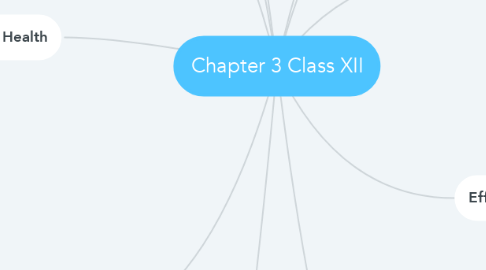
1. Symptoms of Stress
1.1. Physical
1.1.1. Emotional
1.1.1.1. Cognitive
2. Types of Stress
2.1. Environmental & Physical
2.1.1. Psychological
2.1.1.1. Social
2.1.1.1.1. Break up, misunderstanding, illness in the family, bad neighbours etc.
2.1.1.2. Sources - Frustration, Conflict, Internal Pressure, External Pressure
2.1.2. Pollution, heat, noise, crowding etc.
2.1.3. injury, exhaustion, bad nutrition etc
3. Cognitive Theory of Stress
3.1. Primary Appraisal
3.1.1. Positive, Negative, Neutral
3.1.2. Harm Threat Challenge
3.2. Secondary Appraisal
3.2.1. Coping Abilities
3.2.1.1. Resources
4. Stress & Health
4.1. GAS Model
4.1.1. Hans Selye, Alarm Reaction Stage, Resistance Stage & Exhaustion Stage
4.1.1.1. Alarm Reaction Stage - ANS, Pituitary system - Flight or fight
4.1.1.2. Resistance Stage - PNS - Cautious use of body's resources to deal with the stressful situation
4.1.1.3. Exhaustion - Burnout, CHD, BP etc.
4.2. Stress & Immunity
4.2.1. Psychoneuroimmunology
4.2.1.1. Stress reduces killer cell cytotoxicity
4.2.1.1.1. Stress reduces immunity in the body
4.2.2. Prolonged effect of stress hormone - weakened digestion, enlarged lung passages, constricted blood vessels
4.3. Burnout
4.3.1. Complete state of PEP exhaustion after prolonged chronic stress
4.4. Lifestyle
4.4.1. Stress may lead to unhealthy lifestyle like no exercise, poor nutrition, addictions, abuse of drugs, smoking & other health impairing behaviors
5. Coping Strategies
5.1. Endler & Parker
5.1.1. Task Oriented
5.1.2. Avoidance Oriented
5.1.3. Emotion Oriented
5.2. Lazarus & Folkman
5.2.1. Problem Focused
5.2.2. Emotion Focused
6. Promoting positive health & well being
6.1. Stress Resistant Personality by Kobasa , Hardiness & Cs
6.1.1. Commitment
6.1.2. Control
6.1.3. Challenge
6.2. Life Skills
6.2.1. Assertiveness
6.2.1.1. Calm, composed, confident communication of things that matter to you
6.2.1.2. Ability to say no
6.2.1.3. Ability to take up for yourself
6.2.2. Time Management
6.2.2.1. Prioritizing
6.2.2.1.1. Planning
6.2.2.2. Spending precious time doing things that will add value to your life
6.2.3. Self Care
6.2.3.1. Healthy & Relaxed
6.2.4. Improving Relationships
6.2.5. Rational Thinking
6.2.5.1. Distorted thinking leads to stress
6.2.5.1.1. Challenge your negative thoughts , replace irrational beliefs, drive out negativity to make way for positivity
6.2.6. Overcoming unhelpful habits
6.2.6.1. Perfectionism, avoidance, procrastination
6.3. Stress buffers for positive health
6.3.1. Diet
6.3.2. Exercise
6.3.3. Social Support
6.3.3.1. Information Support
6.3.3.2. Tangible Support
6.3.3.3. Emotional Support
6.3.4. Positive Attitude
6.3.5. Positive thinking
6.4. Positive Health - Complete physical, mental, social & spiritual well being
6.4.1. Healthy Body
6.4.2. High quality of personal relationships
6.4.3. Sense of Purpose
6.4.4. Self Regard
6.4.5. Mastery of life's tasks
6.4.6. Resilience to stress, trauma, change
6.4.7. Physical,
7. What is stress
7.1. Transactional Cognitive State
7.2. Subjective Interpretation of an event
8. Kinds of Stress
8.1. Eustress the good stress
8.1.1. Distress The bad stress
9. Sources of Stress
9.1. Life Events
9.1.1. Posting, change of city, change of house, school etc.
9.2. Hassles
9.2.1. Daily hassles of life like traffic, water & power shortage etc.
9.3. Traumatic Events
9.3.1. Death of a loved one, natural disasters like floods, earthquake etc.
10. Effects of Stress
10.1. Physiological Effects
10.1.1. ANS
10.1.1.1. Stress Hormones like Epinephrine & Nor Epinephrine
10.1.1.2. Pituitary Glands secreting Cortisol
10.1.2. PNS
10.2. Emotional Effects
10.2.1. Worry, anxiety, mood swings, depression, hopelessness etc.
10.3. Cognitive Effects
10.3.1. Lack of concentration, focus, inability to take decisions etc.
10.4. Behavioral Effects
10.4.1. Too much or too less sleep, too much or too less food, absenteeism, lowering of work standards and performance etc.
11. Stress Management Techniques
11.1. Relaxation
11.1.1. Progressive Muscle Relaxation through deep breathing
11.2. Meditation
11.2.1. Refocusing attention
11.2.2. Altered states of consciousness
11.3. Biofeedback
11.3.1. Taking feedback about body's physiological responses when under stress, using the feedback to control physiological responses in quiet conditions, transferring this control to a stressful situation
11.4. Creative Visualisation
11.4.1. Using imagery and imagination
11.5. CBT
11.5.1. Replacement of negative & irrational thoughts with rational ones
11.6. Exercise
11.6.1. at least 4 times a week for 30 mins each session to include warm up, exercise, cool down
11.6.2. Cycling, walking, swimming, yoga, aerobics, dance etc.
11.6.3. Has many benefits for overall health & well being
11.6.4. Helps provide an outlet for extra energy during stress
